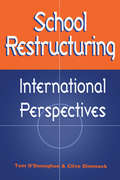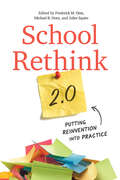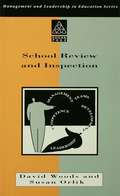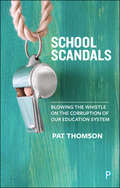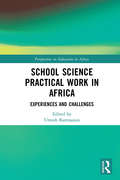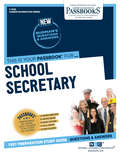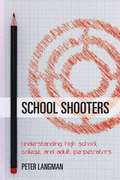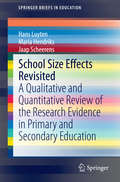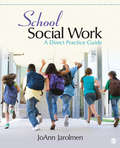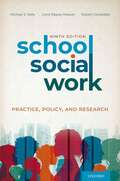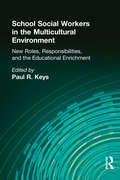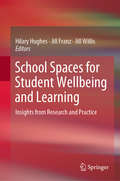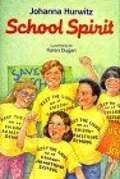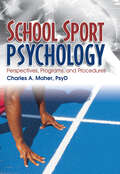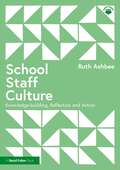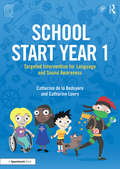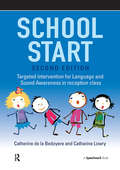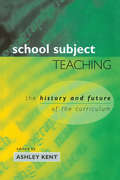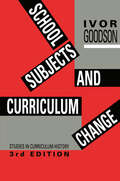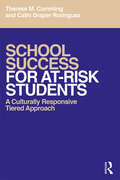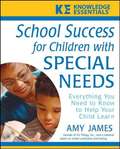- Table View
- List View
School Restructuring: International Perspectives
by Dimmock, Clive O'Donoghue, TomThis is an examination of restructuring in the context of the curriculum and teaching and learning. International case studies are provided from the USA, Hong Kong, Australia and the UK.
School Rethink 2.0: Putting Reinvention into Practice
by Frederick M. Hess Michael B. Horn Juliet SquireTen brilliant approaches that are disrupting US education and actionable advice for their broader implementation
School Review and Inspection (Management And Leadership In Education Ser.)
by Orlik, Susan Woods, DavidThe aim of school inspection is to identify strengths and weaknesses in order that schools may improve educational quality and raise standards. This text examines the role of school inspectors and advises teachers and heads on methodologies for internal review and improvement.
School Rules
by Larry Dane BrimnerAlex, Three J, Gabby, and their classmates decide on rules of behavior so that the class can work well together.
School Rules
by Rebecca RabyHow much say should students have in shaping their schools' disciplinary cultures? Should they have the power to weigh in on contentious issues like favouritism, discrimination, 'no hats' rules, and zero tolerance? What if pupils disagree with their teachers and administrators on certain rules? Rebecca Raby reflects on how regulations are made, applied, and negotiated in educational settings in the accessibly written School Rules.Through an in-depth analysis of original data, including interviews with teachers, administrators, and students, and codes of conduct, School Rules reveals what rules mean to different participants, and where it is that they becoming a challenge. Raby investigates students' acceptance or contestation of disciplinary regulations, and examines how school rules reflect and perpetuate existing inequalities and students' beliefs about young people. Illustrating the practical challenges and political and theoretical concerns of involving students in rule-making, School Rules can help teachers and administrators facilitate more meaningful rules and student participation in their own schools.
School Scandals: Blowing the Whistle on the Corruption of Our Education System
by Pat ThomsonWith almost daily reports of failings in school management, what can be done to improve educational outcomes for everyone? Pat Thomson takes on England’s muddled education system, highlighting failings caused by the actions of ministers in successive governments. While corrupt actions are taken by some, it is predominantly the corruption of the system that is at fault. She exposes fraudulent and unethical practices, including the skewing of the curriculum and manipulation of results, and argues for an urgent review, leading to a revitalised education system that has the public good at its heart.
School Science Practical Work in Africa: Experiences and Challenges (Perspectives on Education in Africa)
by Umesh RamnarainSchool Science Practical Work in Africa presents the scope of research and practice of science practical work in African schools. It brings together prominent science educators and researchers from Africa to share their experience and findings on pedagogical innovations and research-informed practices on school science practical work. The book highlights trends and patterns in the enactment and role of practical work across African countries. Practical work is regarded as intrinsic to science teaching and learning and the form of practical work that is strongly advocated is inquiry-based learning, which signals a definite paradigm shift from the traditional teacher-dominated to a learner-centered approach. The book provides empirical research on approaches to practical work, contextual factors in the enactment of practical work, and professional development in teaching practical work. This book will be of great interest to academics, researchers and post-graduate students in the fields of science education and educational policy.
School Secretary: Passbooks Study Guide (Career Examination Series)
by National Learning CorporationThe School Secretary Passbook® prepares you for your test by allowing you to take practice exams in the subjects you need to study. It provides hundreds of questions and answers in the areas that will likely be covered on your upcoming exam, including but not limited to: grammar, spelling, usage and punctuation; keyboarding practices; office record keeping; office practices; word processing; and more.
School Segregation and Social Cohesion in Santiago: Perspectives from the Chilean Experience (International Study of City Youth Education #3)
by Andres MolinaThis book examines the consequences of educational segregation from the perspective of social cohesion. It investigates the impact of separating students along socioeconomic lines on student attitudes, dispositions and outlooks considered important for social cohesion as well as on achievement, opening the discussion about the social costs of school segregation. The separation of students based on their social background is a common feature of schooling in many modern systems. This is not only due to the influence of residential segregation but also to the effects of policies promoting educational privatisation, parental choice and student academic selection. By recognising the importance of schooling for citizenship and social integration, the chapters in this book explore how the separation of students throughout their school lives can contribute to the division of citizens beyond school, and how social segregation in school systems affect social cohesion more broadly.By exploring the case of Santiago, Chile, the study is a timely contribution to the understanding of the roots of social division and the role that schools play in creating cohesive societies. The originality of the approach and the evidence presented draw on implications that should be of interest to a wider audience concerned with contemporary discussions on solidarity and its erosion by educational segregation in urban environments.
School Shooters: Understanding High School, College, and Adult Perpetrators
by Peter LangmanSchool shootings scare everyone, even those not immediately affected. They make national and international news. They make parents afraid to send their children off to school. But they also lead to generalizations about those who perpetrate them. Most assumptions about the perpetrators are wrong and many of the warning signs are missed until it's too late. Here, Peter Langman takes a look at 48 national and international cases of school shootings in order to dispel the myths, explore the motives, and expose the realities of preventing school shootings from happening in the future, including identifying at risk individuals and helping them to seek help before it's too late.
School Size Effects Revisited
by Jaap Scheerens Hans Luyten Maria HendriksThis book provides a thorough review of the research literature on the effect of school size in primary and secondary education on three types of outcomes: student achievement, non-cognitive outcomes and costs per student. Based on 84 scientific publications and several prior reviews, the book discusses four main areas: the impact of school size on cognitive learning outcomes and non-cognitive outcomes; the "state of the art" of empirical research on economies of size; the direct and indirect impact of school size, conditioned by other school context variables on student performance and the specific position of the Netherlands in an international perspective. The book presents summaries of the results and main conclusions found and discusses these with respect to their relevance for educational policy in general and for the Netherlands in particular. The book concludes with suggestions for future research on school size.
School Social Work: A Direct Practice Guide
by Joann JarolmenOffering a unique focus on evidence-based interventions, critical thinking, and diversity, School Social Work: A Direct Practice Guide, by JoAnn Jarolmen, covers the foundations of working with children and adolescents in the schools. Each chapter reviews a basic concept and then provides two in-depth activities that allow readers to apply the concepts to a variety of client populations. Practical, hands-on experiences, best practice approaches, and case examples throughout the book allow readers to see assessments and techniques in action and increase their understanding of the nuances and complexities of working in a school environment.
School Social Work: Practice, Policy, and Research
by Michael S. Kelly Carol Rippey Massat Robert ConstableSchool Social Work: Practice, Policy, and Research has been a foundational guide to the profession for over 40 years. Featuring 30 readings divided into five parts, this best-selling text reflects the many ways that school social work practice impacts academic, behavioral, and social outcomes for both youths and the broader school community. The essays include selections from both pioneers in the field and newcomers who address the remarkable changes and growing complexities of the profession. <p><p>The ninth edition of School Social Work features a stronger focus on evidence informed practice and adds substantial new content related to antiracist practice and trauma-informed care. It retains the holistic model of school social work practice that has informed all previous editions of this cornerstone text, making it a relevant and vital resource for today's practitioners and students as schools grapple with how to deal with the COVID-19 pandemic and its aftermath.
School Social Workers in the Multicultural Environment: New Roles, Responsibilities, and Educational Enrichment
by Paul R KeysSchool Social Workers in the Multicultural Environment is a new approach for creating diversity in classroom and field curricula. The contributing authors offer practical advice for the effective teaching of multicultural content, which is now a requirement in the Curriculum Standards of the Council on Social Work Education. The authors address existing fears some readers may have regarding the teaching of multicultural content in social work and provide educators and field instructors with a model for overcoming these fears and for creating classroom excellence. Multicultural Education offers educators a chance to explore how to implement the required material effectively.While offering guidance to educators, School Social Workers in the Multicultural Environment focuses on fundamental and controversial approaches to multicultural social work education by answering these questions: Do educators know how to teach multicultural social work content? Where should multicultural content be taught? Should schools offer courses or workshops to facilitate faculty development? How should schools monitor multicultural outcomes? In what way should content be evaluated--peer evaluation, formal teaching observations, or other methods?School Social Workers in the Multicultural Environment, written by experienced educators, field instructors, and practitioners, provides advice on the teaching of multicultural social work content in both urban and rural areas and among many different populations. The book examines in depth the unspoken myths and fears encountered in teaching multiculturalism to students and helps educators and curriculum planners avoid common, unfortunate mistakes often made in multicultural classrooms and field instruction. Topics discussed include: Student Learning Processes for Multicultural Content Classroom-Tested Teaching Strategies for Cultural Competence in Practice Classes A Model for Measuring Multicultural Outcomes Perceived Racism and Minority Student Retention Differing Student and Educator Perceptions in Field Instruction Field Instruction Strategies for Successfully Teaching Cultural, Ethnic, Gender, Class, and Age Characteristics Rural Diversity Education Strategies American Indian Social Work Student Issues Human services educators and curriculum planners, who must effectively teach and implement multiculturalism in their programs, will find School Social Workers in the Multicultural Environment leads the way in creating classroom excellence. It stresses the importance of creating a new model for teaching and practice, for students and educators.
School Spaces for Student Wellbeing and Learning: Insights from Research and Practice
by Hilary Hughes Jill Franz Jill WillisThis book introduces a new wellbeing dimension to the theory and practice of learning space design for early childhood and school contexts. It highlights vital, yet generally overlooked relationships between the learning environment and student learning and wellbeing, and reveals the potential of participatory, values-based design approaches to create learning spaces that respond to contemporary learners’ needs. Focusing on three main themes it explores conceptual understandings of learning spaces and wellbeing; students’ lived experience and needs of learning spaces; and the development of a new theory and its practical application to the design of learning spaces that enhance student wellbeing. It examines these complex and interwoven topics through various theoretical lenses and provides an extensive, current literature review that connects learning environment design and learner wellbeing in a wide range of educational settings from early years to secondary school. Offering transferable approaches and a new theoretical model of wellbeing as flourishing to support the design of innovative learning environments, this book is of interest to researchers, tertiary educators and students in the education and design fields, as well as school administrators and facility managers, teachers, architects and designers.
School Spirit
by Johanna HurwitzJulio and other students at Edison-Armstrong Elementary School organize to prevent the closing of their school.
School Spirits (A Hex Hall Novel)
by Rachel HawkinsFifteen-year-old Izzy Brannick was trained to fight monsters. For centuries, her family has hunted magical creatures. But when Izzy's older sister vanishes without a trace while on a job, Izzy's mom decides they need to take a break. Izzy and her mom move to a new town, but they soon discover it's not as normal as it appears. A series of hauntings has been plaguing the local high school, and Izzy is determined to prove her worth and investigate. But assuming the guise of an average teenager is easier said than done. For a tough girl who's always been on her own, it's strange to suddenly make friends and maybe even have a crush. Can Izzy trust her new friends to help find the secret behind the hauntings before more people get hurt?
School Sport Psychology: Perspectives, Programs, and Procedures (Published Simultaneously As The Journal Of Applied School Psychology, Vol. 21, No. 2 Ser.)
by Charles A MaherFind out how-and why-sports can help you better understand your studentsBecause participation in sports is an integral part of the educational experience for students in both public and private schools, it&’s essential that school psychologists and counselors have a solid foundation to help ensure the well-being of student-athletes. School Sport Psychology is a comprehensive overview of this fast-growing field with guidelines for school psychologists who want to gain a better understanding of sport psychology to extend their skills and enhance their effectiveness. The book presents perspectives, programs, and procedures for working with administrators and coaches to help students develop physically, mentally, and emotionally.School Sport Psychology examines the practical interfaces between school and sport psychology, with an emphasis on parent and family involvement. Contributors representing sport psychology, school psychology, and clinical and community disciplines examine the theory, research, and practice of sport psychology and how its evolution parallels the development of school psychology. The book addresses the benefits and risks of using sport to promote the development of self-esteem, identity, and feelings of competence in students. School Sport Psychology examines: evidence-based sport psychology programs, including GOALS, ATLAS, and ATHENA a case study of the design and implementation of a sport psychology program in an urban high school the use and abuse of alcohol and other drugs among high school student-athletes the use and abuse of steroids eating disorders among high school student-athletes a systems-oriented method of school/sport psychology assessment and intervention program planning and evaluation framework the knowledge and skills needed to work in sport psychology and much moreSchool Sport Psychology is an essential professional resource for psychologists, counselors, and health service providers.
School Staff Culture: Knowledge-building, Reflection and Action
by Ruth AshbeeA powerful school culture can unite staff in a common vision, shape positive behaviours and attitudes, and create the conditions for the staff body to work as one. As the recruitment and retention crisis deepens, staff culture is more important than ever. This book explores how schools can develop a culture where individuals take pride in their work and actively seek and embrace development and challenge, seeing the big picture of the school and cherishing their role in it. Drawing on key ideas from systems theory, psychology, anthropology, business and philosophy, this book explores the key ideas we need in order to understand culture and the concrete steps we can take in order to intentionally develop our staff culture in a positive direction. Each chapter features powerful input to strengthen our understanding alongside probing reflections to guide our own development. Written by a leading practitioner and designed to support reflections and planning for concrete actions, this is essential reading for school leaders and head teachers wanting to develop an authentic, powerful and positive school staff culture. School Staff Culture benefits from a completely free school development package, with session plans, slides and resources to structure a programme of sessions for leadership and specialist culture teams. The package supports the input, reflection, discussion, evaluation and contextualised application and review that will really bring the ideas in School Staff Culture to life in a school, and can be downloaded from www.routledge.com/9781032121963.
School Start Year 1: Targeted Intervention for Language and Sound Awareness (School Start)
by Catherine de la Bedoyere Catharine LowryThis highly practical resource is designed to be used with children who need additional help in developing communication skills in Year 1. It offers a carefully structured group intervention which can be delivered by teachers or teaching assistants and is designed to boost language and sound awareness skills School Start Year 1 includes: detailed advice on how to set up the programme and identify children who may benefit; a structured programme of 30 Language group sessions; a structured programme of 30 Sound Awareness group sessions; activities and learning objectives that link with the Primary curriculum; 56 resource templates that can be photocopied or downloaded from the website; templates to monitor each child’s objectives and an end of year evaluation. Activities are supported by colourful and original illustrations to engage children’s interest and are themed around topics such as animal antics, detective stories and the seaside. An additional 5 template sessions are provided which can be used to extend the programme into Year 2. The authors provide clear guidance on how to use the resources and include an FAQ section for schools, parents and Speech and Language Therapists. This latest resource is a follow on to the hugely popular School Start and Pre-School Start and has been successfully piloted in schools. This is an invaluable resource for primary school staff that encourages good collaborative practice between teachers, teaching assistants, inclusion co-ordinators, SENCOs, speech and language therapists and parents.
School Start: Targeted Intervention for Language and Sound Awareness in Reception Class, 2nd Edition (School Start)
by Catherine de la Bedoyere Cath LowryThis is a practical resource that can be used with children who need additional help in developing communication skills during the first year of school and is a follow-on from the hugely successful first edition. This second edition focuses primarily on a targeted group intervention, to boost the language and sound awareness skills of children entering reception class, who are delayed in these areas of communication. It also addresses aspects of attention, following instructions and social communication.School Start, aims to help children catch up so that they may be ready to access the learning environment of Year 1. It is an invaluable resource for teachers and teaching assistants that encourages good collaborative practice between schools, speech & language therapists, the SENCO and parents. The programme consist of: an initial six-week period so that educational staff may identify children of concern; a screening checklist to confirm the identification of those children a structured programme of 30 Language group sessions that teaching assistants will find quick and easy to follow, delivered once a week a structured programme of 30 Sound Awareness group sessions that teaching assistants will find quick and easy to follow, delivered once a week activities and learning objectives linked into communication at home and in class monitoring of each child's objectives and readministration of the checklist in July. Teachers and teaching assistants first select children suitable for the programme through the checklists provided; set-up meetings then take place between the inclusion coordinator and school before the child is enrolled on the programme. Devised by two speech & language therapists experienced in working with teaching staff, the book consists of two 30-week programmes aimed at developing Language and Sound Awareness skills. Each six-week block has clearly written objectives that are linked to the National Curriculum Foundation Stage. Baseline and evaluation checklists are also provided to monitor each child's progress.School Start offers: an introduction on how to use the School Start programme group sessions for the Language and Sound Awareness programmes 70 photocopiable resource templates programme delivery templates containing all the checklists, record sheets and handouts needed to carry out the programme an accompanying CD-Rom giving the option to print out some of the resource templates in colour. Successfully trialled over a three-year period, School Start is an invaluable resource for teachers and teaching assistants that encourages good collaborative practice between schools, speech & language therapists, the school's inclusion coordinator and parents.
School Subject Teaching: The History and Future of the Curriculum
by Ashley KentCovering each of the core curriculum areas in turn, this is a reference on school subject teaching. The authors assess the development of teaching within each subject area since the 1944 Education Act up to the year 2000. Future challenges are also explored.
School Subjects and Curriculum Change
by Ivor F. GoodsonThe process of curriculum development is highly practical, as Goodson shows in this enlarged anniversary third edition of his seminal work. The position of subjects and their development within the curriculum is illustrated by looking at how school subjects, in particular, geography and biology, gained academic and intellectual respectability within the whole curriculum during the late 1960s and early 1970s. He highlights how subjects owe their formation and accreditation to competing status and their power to compete in the provision of 'worthwhile' knowledge and considers subjects as continually changing sub-groups of information. Such subjects from the framework of the society in which individuals live and over which they have influence. This volume questions the basis on which subject disciplines are developed and formulates new possibilities for curriculum development and reform in a post-modrnist age.
School Success for At-Risk Students: A Culturally Responsive Tiered Approach
by Therese M. Cumming Cathi Draper RodriguezSchool Success for At-Risk Students: A Culturally Responsive Tiered Approach introduces a model that incorporates cultural responsiveness into the familiar three-tiered model of behavioural and academic support. The model is designed to modify learning environments to support all students, identify students at risk, and provide a continuum of supports for those who need it. The characteristics, outcomes, and support needs of at-risk students are explored in detail. These students include those with disabilities, those who are English language learners, refugees, indigenous, LGBT+, students from low SES backgrounds, and those who are involved with the juvenile justice or out-of-home care systems. The concepts of cultural responsiveness and competence are defined and discussed, then incorporated into a framework that includes the Response to Intervention and Positive Behavioural Interventions and Supports frameworks. This revised framework is investigated in regards to theory, research, and practice. The importance of cultural competence for at-risk students and ways to improve this in schools are suggested. This book is a necessary companion for educators and researchers who have an interest in exploring the nature and context of educating at-risk students from the perspective of a culturally responsive multi-tiered system of support. It will also be of interest to a wide range of individuals working in education with at-risk youth, including preservice and veteran teachers, leadership teams, school psychologists, and school counsellors, as well as teacher educators.
School Success for Children with Special Needs: Everything You Need to Know to Help Your Child Learn
by Amy JamesEvery child has special needs, but for those whose needs are identified as disabilities, parents and other caregivers must serve as advocates to ensure children receive the proper support. Consultant James, whose tenure as a teacher included helping to plan Individualized Education Programs (IEPs) for students considered disabled who are mainstreamed into standard classrooms, sorts out the legislation (including the Individuals with Disabilities in Education Act, the Americans with Disabilities Act and the No Child Left Behind Act), and provides extensive information in ways teachers and schools can or must accommodate a child with special needs. She covers physical, mental and learning disabilities, describes the assessment process and the role of the parent or caregiver in evaluation, the role of the caregiver as part of the education team at all ages, and steps to take when the child enters the world outside the classroom.
